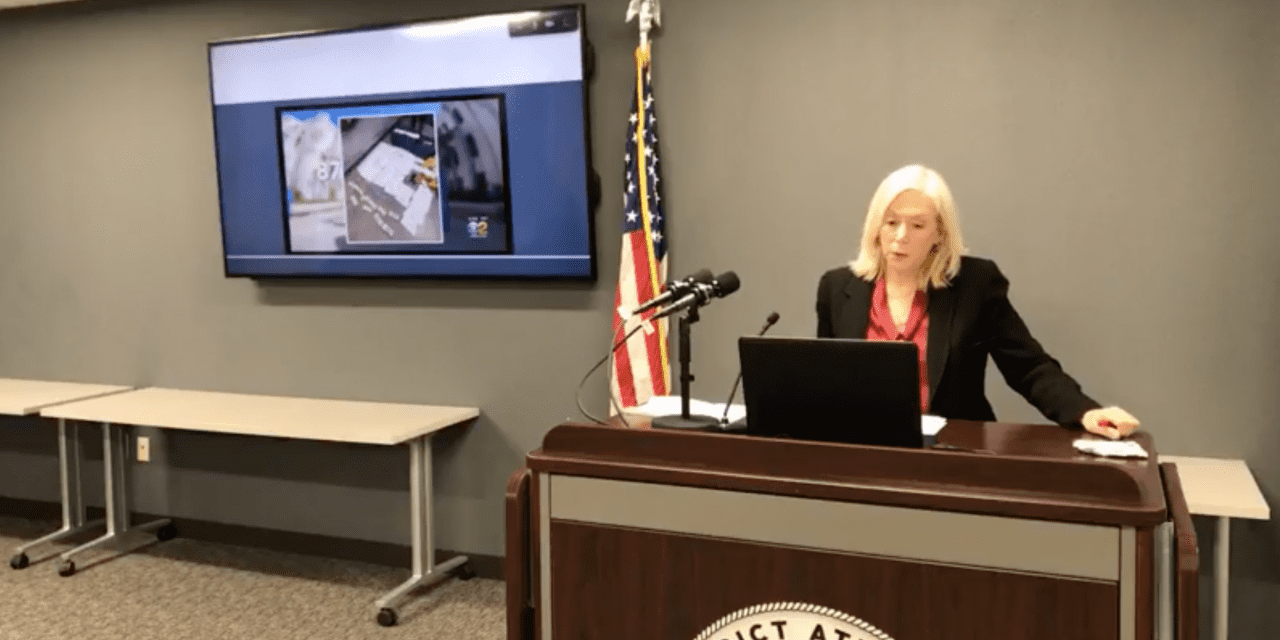SACRAMENTO — Prosecutors from nine counties on Tuesday, Nov. 24, announced a “massive fraud” investigation involving inmates at California prisons and jails who successfully filed thousands of jobless claims during the COVID-19 pandemic.
The fraud involves inmates at county jails and prisons falsely getting money from California’s Employment Development Department. EDD manages unemployment benefits.
Sacramento County District Attorney Anne Marie Schubert said it is believed the losses total hundreds of millions of dollars, up to $1 billion. Schubert said this “will be one of the biggest fraud of taxpayer dollars in California history.”
The San Luis Obispo County District Attorney’s Office was not part of the team of prosecutors that held the hour-long press conference Tuesday. SLO County District Attorney Dan Dow posted the video and provided a statement on Facebook.
“Many San Luis Obispo County criminal offenders and prisoners are on the list, including Rex Krebs, who is on death row,” Dow stated. “This is massive fraud that harms every taxpayer in California. Those who negligently allowed this massive fraud need to be held accountable. Due to dysfunctional state government agencies and inadequate fraud prevention measures, early estimates are that hundreds of millions of dollars in unemployment checks have been sent to individuals in the names of inmates in California’s prisons and jails, including many prisoners serving life sentences or being held on death row.”
State Assemblyman Jordan Cunninghan (R-Templeton) also weighed in on the investigation.
“While thousands of Central Coast residents struggle to get their rightful unemployment benefits, death row inmates seem to have no problems defrauding the system and stealing undeserved benefits,” Cunningham stated. “Just when we thought EDD couldn’t be more flawed, they have found another way to surprise us. We need to fix EDD now and when the Legislature resumes session I will again be demanding a full and complete audit.”
Krebs was convicted of raping and murdering San Luis Obispo college students Rachel Newhouse and Aundria Crawford in 1998 and 1999, respectively. He was sentenced to death and housed at San Quentin State Prison.
Authorities said that between March and August, 35,000 inmates filed unemployment claims while behind bars through the state’s Employment Development Department.
Of that, 20,000 claims were paid out, totaling more than $140 million.
Schubert said EDD fraud is running rampant through California’s prison system.
“It exists in every CDCR prison. It encompasses every type of inmate.”
Authorities said 135 California death row inmates received jobless benefits, including notorious serial killers like Wayne Ford and Cary Stayner, who are housed at San Quentin with Krebs.
In August, $420,000 in benefits were paid to death row inmates. It’s unclear if the inmates could cash the debit cards they received.
“The murderers, and rapists, and human traffickers should not be getting this money,” said Schubert. “It needs to stop.”
Inmates filed claims using real names, addresses and Social Security numbers, said Schubert. Some used fake names such as “John Doe” and “Poopy Britches.”
Officials believe many of the inmates worked with people on the outside to defraud the state’s unemployment system and some may be part of organized rings.
Prosecutors from San Mateo County, where there was a similar jailhouse scam, explained that in the government’s haste to ensure that Americans got their unemployment checks quickly during the COVID-19 pandemic, few safeguards were placed on EDD forms to avoid bureaucratic hurdles.
“Multiple cards sent to individual addresses both across the jails, the prisons, and likey from the outside. This is very, very organized theft rings to get billions of dollars,” Schubert said.
Authorities in San Mateo County learned what was happening through recorded jail calls. In one case, an investigator listened to a call between an inmate at San Mateo County Jail and someone on the outside. They talked about the EDD scam that inmates were doing.
“That’s what caught the attention back in July here at the San Mateo County Jail of what’s going on. So my inspector followed up on this. We got that inmate, and we took all the inmate names that were mentioned on the call and ran them through EDD,” said San Mateo County District Attorney Stephen Wagstaffe.
State and local agencies will try and recoup the money, but there are limits on how much they could do, given that some of the inmates are on death row or serving life sentences.
“The practical reality is — when you’re talking about thousands of convicted felons engaged in this behavior, despite best efforts, the practical reality is the vast majority of this money will not be repaid,” said El Dorado County District Attorney Vern Pierson.
Schubert said the money would continue being sent to inmates if the state doesn’t regularly check for this type of fraud.
“We need to turn off the spigot,” Schubert said. “Right now, there is no cross-matching between the incarceration data and EDD on a routine basis like it’s being done in other states.”
Pierson said the fraud’s impact was on taxpayers and unemployed Californians who have not received their benefits because of the state’s backlog or who can’t navigate the EDD system as easily as some inmates.
“They don’t know how to go through the process to get these things done,” Pierson said. “They [inmates] communicate with each other. They say, ‘this is how you fill the form out. This is the information you have to make sure is in there.’”
The team of district attorneys said they created a statewide EDD Fraud Task Force and sent a letter to Gov. Gavin Newsom asking for help.














